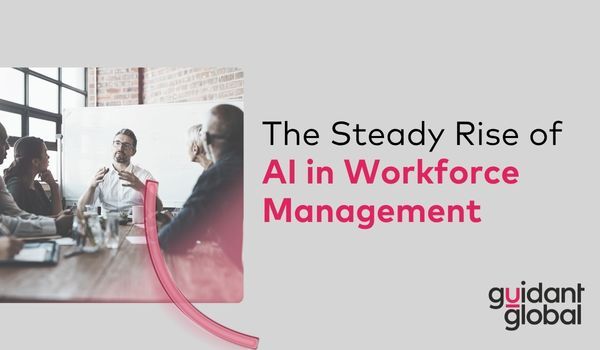
Artificial Intelligence (AI) is steadily reshaping workforce management, particularly in recruitment, where its application is proving transformative.
As businesses aim to improve efficiency without overhauling all operations, AI is increasingly viewed as a tool for targeted solutions rather than a universal fix.
Selective integration: A practical approach
According to recent research from Guidant Global, most organisations are adopting AI selectively, leveraging its capabilities in areas where it has the most significant impact. This gradual integration enables businesses to assess AI’s effectiveness without overwhelming their existing systems. In workforce management, AI is primarily used to enhance talent acquisition processes.
Key applications include:
- Screening and shortlisting candidates: Used by 53% of tech workers, this application streamlines the initial stages of recruitment, reducing manual effort.
- Sourcing and attracting candidates: 38% of respondents reported using AI to identify and engage potential talent effectively.
- Interview scheduling: 36% leverage AI for automating and organising interviews, saving time and effort.
- Technical testing: Another 36% use AI to assess candidates’ skills, ensuring precision and consistency.
- Onboarding: Though used less extensively (17%), AI is helping design personalised training programs and automate administrative tasks for new hires.
The core benefits of AI
One of AI's most cited advantages is its ability to enhance recruitment speed and efficiency. By minimising manual tasks and optimising processes, AI ensures hiring managers can focus on strategic decisions.
The benefits of AI in recruitment include:
- Speed and efficiency: The top benefit, cited by 48% of respondents, reflects AI’s potential to reduce time spent on recruitment processes.
- Finding better-quality candidates: 18% highlighted AI’s ability to improve the accuracy of matches between candidates and roles.
- Cost reduction: By automating tasks, AI helps save costs, with 15% emphasising its financial benefits.
- Reducing bias: 10% noted AI’s contribution to fairer hiring practices by minimising unconscious bias.
- Enhanced candidate and hiring manager experience: 7% acknowledged AI’s role in improving the overall recruitment experience.
Challenges in widespread adoption
Despite these advantages, broad and integrated adoption of AI in recruitment and workforce management remains a challenge for many organisations. Screening and shortlisting candidates dominate AI applications, suggesting a focus on optimising labour-intensive processes.
However, other stages such as onboarding and enhancing candidate engagement are less explored, illustrating the need for more comprehensive implementation strategies.
Next steps in AI in workforce management
To further integrate AI into workforce management, organisations will need to focus on expanding its application beyond the initial stages of recruitment. This involves leveraging AI not just for efficiency but also for improving candidate experience, engagement, and diversity within the hiring funnel. As adoption grows, businesses must strike a balance between workforce automation and human oversight to preserve the ‘human touch’ in recruitment.
The steady rise of AI in workforce management is not just a trend; it’s a shift that is redefining talent acquisition strategies. By continuing to explore and integrate AI gradually, selectively, but steadily, organisations can unlock its full potential while addressing challenges and ensuring ethical implementation.
The journey towards widespread adoption of AI in workforce management is ongoing, and its transformative impact is only beginning to unfold.
Unlock the full potential of AI driven workforce solutions
If you’re looking to unlock the full potential of AI in recruitment and workforce management, download Guidant Global’s full research report. Compiled from a survey of over 100 UK & European HR, People & Resourcing leaders, this report offers a deep dive into:
- The current level of awareness and sentiment towards AI in recruitment.
- The effectiveness of AI tools in enhancing recruitment processes.
- The impact of AI on tech and non-tech roles within organisations.
- Key concerns surrounding AI implementation, such as loss of the human touch, privacy, and data security.
- The primary benefits of AI in recruitment, including speed, efficiency, and better-quality candidate matches.
- Future trends and the growing need for AI skills in the workplace.

